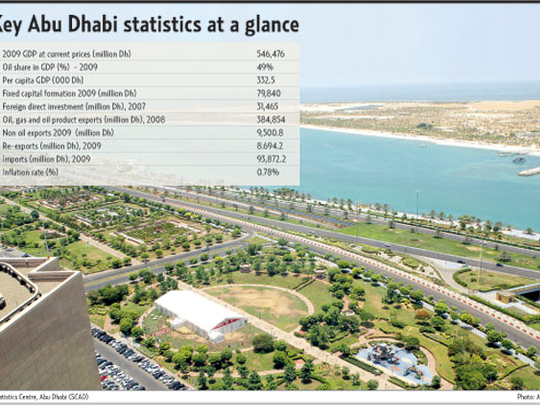
Abu Dhabi: Abu Dhabi's gross domestic product (GDP) at current prices declined to Dh546.5 billion in 2009 from Dh666.7 billion in 2008 due to lower oil prices, the Statistical Yearbook of Abu Dhabi 2010, released yesterday, showed.
"The economy of the emirate of Abu Dhabi saw record growth in the years preceding 2009; the year which saw a marked drop in GDP due to the decline in oil prices in the wake of the global financial crisis. Despite the consequent decline in the emirate's per capita GDP to Dh332,500 in 2009, it remains one of the highest worldwide," the yearbook noted.
Total fixed capital formation grew to Dh79.84 billion in 2009, up from Dh72.673 billion in 2008, the data showed.
The contribution of oil to GDP of Abu Dhabi in 2009 was 49 per cent, the Director-General of Statistics Centre-Abu Dhabi (SCAD), Butti Mohammad Bin Butti Al Qubaisi said.
"It is the first time the emirate has managed to reduce the contribution of oil to this record low ratio. This result confirms that the emirate's programmes to expand the economic base and diversify the sources of income are progressing successfully," said Al Qubaisi at the release of the Yearbook.
Favourable outcome
He added that the financial crisis had some favourable implications for Abu Dhabi's economy. Citing an example, Al Qubaisi said inflation retreated from 14.9 per cent in 2008 to less than 1 per cent last year.
Dr Peter Crossman, Assistant Director-General for Technical Affairs at SCAD, said the contribution of oil to Abu Dhabi's GDP fell last year due to robust performance of other sectors which contribute to its GDP mainly the services industry and the manufacturing sector. He said there are no estimates for Abu Dhabi's real GDP.
The SCAD yearbook observed that 2009 was a tough period for economies across the world, owing to the impacts of the global financial crisis.
"Like other countries in the region, the UAE was affected by the crisis. However, the economy of Abu Dhabi showed a great deal of resilience and stability in the face of those turbulent times.
"Supported by the emirate's huge financial surpluses, Abu Dhabi's economy was fast to recover, posting a growth of about 6 per cent for non-oil activities during the last year, thus helping the UAE economy to regain its stability and overcome the repercussions of the financial crisis," the yearbook said.
In 2009, Abu Dhabi's oil reserves stood at 92.2 billion barrels while its total natural gas reserves were estimated at 212 trillion cubic feet. Electric power generation grew 14 per cent on year to 39,189 gigawatt hours (GWh).
Data showed the total value of commodity imports to Abu Dhabi amounted to Dh93.9 billion, the main imports being capital goods and industrial equipment, which accounted for 64.2 per cent of imports. The top supplier was the US, with imports from that country amounting to Dh12.6 billion. Abu Dhabi's non-oil exports totalled Dh9.5 billion, with key goods being plastics and base metals. Re-exports in 2009 were valued at Dh8.7 billion.
The compensation received by workers in all economic activities totalled Dh90.08 billion in 2009, compared to Dh83.02 billion in 2008. In the tourism sector, the number of hotel establishments increased by 13 per cent to 110 in 2009.
The emirate had 668,800 registered vehicles in 2009, and the total length of its highways was 2,099.5 kilometres. It had 2,898,162 mobile phone connections last year.
Aircraft movements through the two international airports in 2009 rose 9.8 per cent on year to 105,392 flights, and passenger traffic rose 6.5 per cent on year to 9.765 million.
The emirate's population in mid-2009 was estimated at about 1.643 million, of whom nearly 25 per cent are Emiratis. About 47 per cent of the emirate's population resides in Abu Dhabi city.
The 2009 life expectancy at birth for nationals, non-nationals and the emirate's total population was 75.5, 73.9 and 74.9 years, respectively.
The yearbook said that oil revenues constitute the main source of funding for Abu Dhabi's programmes of sustainable development and income diversification.
"The value added of this activity contributes 60 per cent of the emirate's GDP, leading the government to adopt a plan aimed at diversifying the economic base and reducing this ratio to 36 per cent by 2030," it noted.












